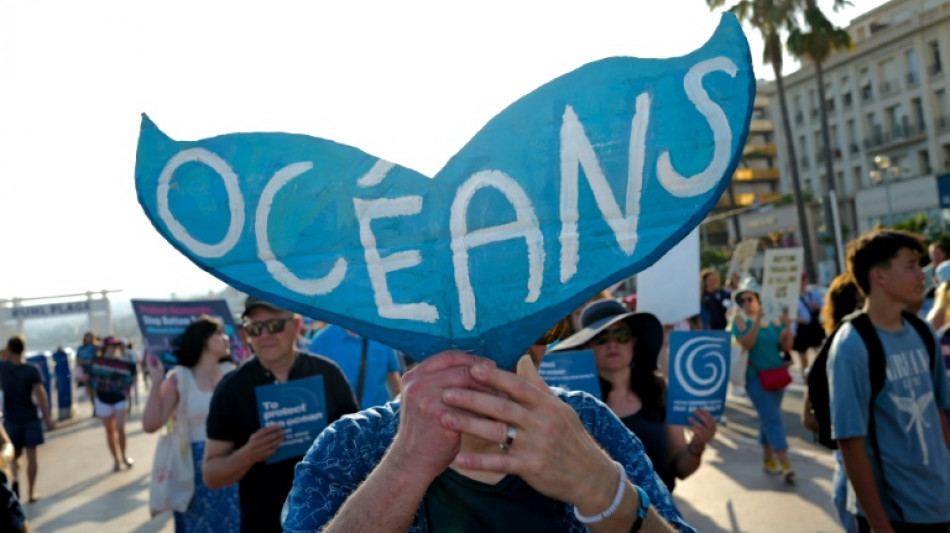
| RBGPF | 1.65% | 83.78 | $ | |
| SCS | 0.12% | 16.14 | $ | |
| RYCEF | -2.69% | 16 | $ | |
| NGG | -0.33% | 84.77 | $ | |
| CMSC | -0.02% | 23.69 | $ | |
| AZN | 0.38% | 92.94 | $ | |
| GSK | 1.03% | 51.18 | $ | |
| BP | 0.09% | 38.075 | $ | |
| BTI | -0.47% | 59.93 | $ | |
| RIO | -3.08% | 92.29 | $ | |
| VOD | -0.55% | 14.63 | $ | |
| BCE | 0.1% | 25.51 | $ | |
| JRI | 0.23% | 12.985 | $ | |
| BCC | -1.31% | 79.132 | $ | |
| RELX | -1.25% | 35.72 | $ | |
| CMSD | 0.05% | 24.073 | $ |
UN summit to tackle 'emergency' in world's oceans

A global summit on the dire state of the oceans kicks off Monday in France, with calls to ban bottom trawling and bolster protections for the world's overexploited marine areas.
World leaders attending the UN Ocean Conference in Nice have been told to come up with concrete ideas -- and money -- to tackle what organisers call a global "emergency" facing the neglected seas.
The appeal for unity comes as nations tussle over a global plastics pollution treaty, and the United States sidesteps international efforts to regulate deep-sea mining.
On the eve of the summit, Brazil's President Luiz Inacio Lula da Silva said that leaders must act now: "The planet can no longer tolerate broken promises."
A wave of new commitments is expected Monday in Nice, where around 60 heads of state and government will join thousands of business leaders, scientists and civil society activists.
"Never in the history of humanity have we brought together so many people for the oceans," French President Emmanuel Macron said Sunday before hosting leaders for an official dinner.
- Trawling targeted -
On Monday, the United Kingdom is expected to announce a partial ban on bottom trawling in half its marine protected areas, putting the destructive fishing method squarely on the summit agenda.
Bottom trawling sees huge fishing nets dragged across the ocean floor, a process shockingly captured in a recent documentary by British naturalist David Attenborough.
Greenpeace welcomed the UK announcement on trawling but said in a statement it was "long overdue".
Macron on Saturday said France would restrict trawling in some of its marine protected areas, but was criticised by environment groups for not going far enough.
French environment minister Agnes Pannier-Runacher told reporters Sunday that other countries would make "important announcements" about the creation of new marine protected areas.
Samoa led the way this past week, announcing that 30 percent of its national waters would be under protection with the creation of nine marine parks.
Just eight percent of global oceans are designated for marine conservation, despite a globally agreed target to achieve 30 percent coverage by 2030.
But even fewer are considered truly protected, as some countries impose next to no rules on what is forbidden in marine zones, or lack the finance to enforce any rules.
- Words into action -
Nations will face calls to cough up the missing finance for ocean protection, which is the least funded of all the UN's 17 sustainable development goals.
Small island states are expected in numbers at the summit, to demand money and political support to combat rising seas, marine trash and the plunder of fish stocks.
The summit will not produce a legally binding agreement at its close like a climate COP or treaty negotiation.
But diplomats and other observers said it could mark a much-needed turning point in global ocean conservation if leaders rose to the occasion.
"The UN Ocean Conference gives us all an opportunity to turn words into bold and ambitious action," said Enric Sala, founder of Pristine Seas, an ocean conservation group.
Another summit priority will be inching towards the numbers required to ratify a global treaty on harmful fishing subsidies, and another on protecting the high seas beyond national control.
France is also spearheading a push for a moratorium on deep-sea mining ahead of a meeting of the International Seabed Authority in July.
D.Kaminski--GL

 London
London

 Manchester
Manchester
 Glasgow
Glasgow
 Dublin
Dublin
 Belfast
Belfast
 Washington
Washington
 Denver
Denver
 Atlanta
Atlanta
 Dallas
Dallas
 Houston Texas
Houston Texas
 New Orleans
New Orleans
 El Paso
El Paso
 Phoenix
Phoenix
 Los Angeles
Los Angeles



